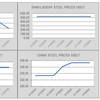The European Community Shipowners' Associations has released the results of a recent update of an Oxford Economics study on the economic value of the EU shipping industry which highlights the industry’s contribution to the European Union's economy based on new data.
The study shows the the marine sector contributed an estimated EUR 147bn ($164bn) to GDP in 2013.
For every EUR 1m generated directly, the industry creates another EUR 1.6bn elsewhere in the European economy, says the study.
Shipping provides jobs for 2.2m people at sea and onshore, more than the airline sector, and direct employment has grown 25% between 2004 and 2013.
‘Europe controls the world’s largest and most innovative fleet of ships’ remarked Patrick Verhoeven, ECSA Secretary General, adding ‘this very important fact is often overlooked despite the fact that it plays a key role in the economic impact of our industry on the European economy’.
The ultimate ownership or control of 40% of the world’s gross tonnage lies in an EU country. What is more, the EU controlled fleet has grown strongly, says the study.
Between the start of 2005 and the start of 2014, the EU controlled fleet expanded by more than 74% in tonnage, and by 72% in terms of deadweight tonnage.
The study, titled “The economic value of the EU shipping industry”, looked to estimate the economic impact of the shipping industry across three channels: the direct impact of the shipping industry itself; the indirect impact of shipping firms’ expenditures across the EU supply chain; and the impact of spending by employees in the shipping industry and supply chain.














